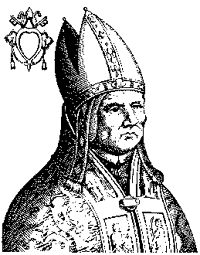 Credulous
folk believed that Gerbert, the learned monk who became Pope Sylvester II, was a
magician, and around this interesting personality grew an aura of occult legend.
But the cold facts of Sylvester's career are too interesting to need any
seasoning from fervid imaginations.
Credulous
folk believed that Gerbert, the learned monk who became Pope Sylvester II, was a
magician, and around this interesting personality grew an aura of occult legend.
But the cold facts of Sylvester's career are too interesting to need any
seasoning from fervid imaginations.
Gerbert was born of lowly origin in Auvergne. Educated by the
Benedictines and by the bishop of Vich in Spain, Gerbert became the leading
Western scholar of his day. Brought to Rome by Borel, count of Barcelona, the
learned monk so impressed Pope John XIII that he sent Gerbert to Otto the Great.
Otto made him tutor to his son, and Gerbert always was close to the imperial
family. After Otto's death Gerbert went to Rheims to teach in the cathedral
school there. He interested himself in literature, music, philosophy, theology,
mathematics, and the natural sciences. His inspirational teaching made Rheims an
intellectual center. As a collector of books Gerbert resembles some of the more
avid Renaissance humanists. Not contented with speculation, this practical man
constructed globes, observation tubes, and a complicated abacus. He is credited
by some with having introduced Arabic numerals to the west and with the
invention of the pendulum clock.
Otto II made him Abbot of St. Columban's monastery at Bobbio,
but he had to fight so much to preserve his abbey's temporalities from greedy
hands that in disgust he soon withdrew to Rheims. There he became a bosom friend
of the political minded Archbishop Adalberon and threw himself into the maze of
intrigue which ended the Carolingian dynasty in France. After this intrigue was
successfully climaxed by the coronation of Hugh Capet in 987, Gerbert might
reasonably have expected to become archbishop of Rheims on Adalberon's death.
But Hugh passed him over for Arnulf. Arnulf, however, sided with his kinsman
Charles of Lorraine when that duke invaded France in an effort to dethrone Hugh.
Hugh captured Arnulf and had a council depose him and elect Gerbert in his
place. Gerbert, who believed devoutly with St. Paul that "if a man desireth the
work of a bishop he desireth a good work," was delighted.
Not so Pope John XV, who frowned on such arbitrary depositions
and elections. When the Pope ordered another and more free council to study the
matter, Gerbert grew rebellious. He gained nothing by it. Suspended, he left
France for the court of Otto III. Though his ambition caused him to be less than
obedient he had too much virtue and good sense not to submit at last. He was
rewarded, for if Otto was unable to get him reinstated at Rheims, he did have
him made archbishop of Ravenna. Soon afterwards Gregory V died and Otto had
Gerbert elected Pope. The combination of the learned Sylvester II, as Gerbert
was now known, and the idealistic Otto promised much for Christendom but the
promise was not fulfilled. The Romans drove both Emperor and Pope out of Rome in
1001, and though Sylvester managed to return after Otto's early death in 1002,
he was overshadowed by Crescentius III. Though this short pontificate was
something of an anticlimax to a colorful career, Sylvester did accomplish
something. He called attention to needs of the Holy Land, he created the see of
Gnesen for the Poles and that of Gran for the Hungarians.
He sent a royal crown to St. Stephen of Hungary. Sylvester II
died May 12, 1003.
Excerpted from "Popes
Through the Ages" by Joseph Brusher, S.J.

